Words of Wisdom - Shastra
& Shastrakaras speak
For Books and shastra downloads see Main Index, under
Books:
Om Namo Bhagavate Vasudevaya
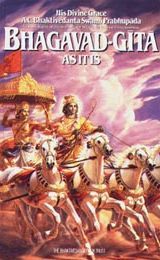


The Complete Works of Srila Prabhupada
All the books, the letters and conversations at your
fingertips


All Srila Prabhupada's books and more on one disk
http://www.vedabase.com





Srila Prabhupada's Audio lectures to listen to on-line:
http://www.hare-krishna.org/srila-prabhupada-lectures.htm
Listen to Srila A.C. Bhaktivedanta Swami Prabhupada on-line
- all 900 of his lectures are available HERE:
http://www.prabhupadavani.org/
Srimad Bhagavatam - the entire lecture series listen and
read along on-line - Narrated by Amala Bhakta dasa:
http://www.prabhupadavani.org/SB_index.html

The new enhanced Prabhupada MP3 series
http://www.prabhupada.com/store/store.php?page=product.php&id=MP3AUDIOLIB

The Audio Srila Prabhupada Lilamrita
Please find enclosed details a being launched on Gaura Purnima day 2008.
It is a simple audio rendition of sections from "Prabhupada,
your ever well-wisher" by Satsvarupa dasa Goswami.
It was recorded here in the UK back in the mid '90's
by Bhagavat-Asraya prabhu (ACBSP) at my studio and I edited it into 8 short
instalments for inclusion on my weekly radio programme "Nectar of Devotion".
We had such a good response from listeners that it was
decided to add "The Audio Srila Prabhupada Lilamrita" to the Nectar of
Devotion website archive page.
In doing so I felt it might be nice to create a very simple,
seperate website for the Lilamrita.
The result is http://www.lilamrita.page.tl
It will be officially launched on Gaura Purnima day 2008
for the pleasure of Srila Prabhupada and all the Vaishnava's.
I hope this humble attempt will add to the growing appreciation
of Srila Prabhupada's remarkable achievements.
If other Krishna conscious radio stations would like
to broadcast this Lilamrita series they can contact me at devotion@nusoundradio.com
and I can send them mp3 copies.

Srila Prabhupada Vyasa-puja book 2007
http://www.krishna.com/node/1048
Vyasa-puja is an annual celebration by the devotees of Lord Krishna
to offer homage to their guru, or spiritual teacher.
There are two versions of the Vyasa Puja Book based on the speed of
your internet connection.
If you are unable to open the file, download Acrobat Reader.
High speed connections, with pictures.
Vyasa-puja
Book 2007 [PDF/ZIP, 2.11MB]
Low speed connections, no pictures.
Vyasa-puja
Book 2007 (no pictures) [PDF/ZIP, 2.11MB]








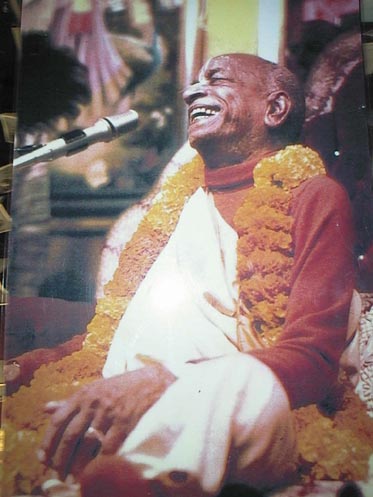
Visit "Prabhupada Connect" for all manner of Prabhupad
Nectar:
http://www.prabhupadaconnect.com/Index.html
Srila Prabhupada's Final Lesson Video - Downloadable and
viewing on-line
http://users.iskconludhiana.com/images/thumbnails.php?album=21


All Srila Prabhupada's original books
available for sale here.

Download all the Hare Krsna teachings which includes
all Vaisnava and
Vedic concepts by visiting one of the sites listed at
the following address.
http://www.geocities.com/suci123/bookdownloadsites1.html
The Bhaktivedanta Book Trust
Srila Prabhupad Memorial Library
http://www.krishna.com/main.php?id=33


33 Books Online Including Srimad Bhagavatam!
http://www.geocities.com/freeprabhupadabooks
The compressed "self extracting" file mentioned is now currently
available for download
http://www.krsnaconsciousness.org/Gauranga/Folio/BhaktivedantaVedabase_DOS.exe

Download or Listen to Prabhupad Bhajans HERE:
http://www.prabhupadavani.org/web/text/Bhajans.html


On-line 1972 McMillan edition - Bhagavad Gita As It Is:
http://www.asitis.com/

Bhagavad Gita AS IT IS on-line through the Tirupathi
Balaji site:
http://www.bhagavad-gita.us/

Bhagavad Gita Study guide on-line book:
http://chantandbehappy.com/gita/studyguide/StudyGuide-main.htm
Bhagavad Gita Study guides by numerous Iskcon devotees
- FREE downloads:
http://www.veda.harekrsna.cz/library/#3

All the Scriptures you'd ever need 4 FREE
http://www.hknet.org.nz/index-books.htm
http://www.hknet.org.nz/DDB.htm
http://www.hknet.org.nz/DDB2.html
last updated 4th August 2003


Srimad Bhagavad Gita AS
IT IS
Bhagavad Gita: Chapter
6 - Dhyana-yoga
TEXT 46
tapasvibhyo 'dhiko yogi
jnanibhyo 'pi mato 'dhikah
karmibhyas cadhiko yogi
tasmad yogi bhavarjuna
WORD FOR WORD
tapasvibhyah--than the ascetics; adhikah--greater; yogi--the
yogi; jnanibhyah--than the wise; api--also; matah--considered; adhikah--greater;
karmibhyah--than the fruitive workers; ca--also; adhikah--greater; yogi--the
yogi; tasmat--therefore; yogi--a transcendentalist; bhava--just become;
arjuna--O Arjuna.
TRANSLATION
A yogi is greater than the ascetic, greater than the empiricist
and greater than the fruitive worker. Therefore, O Arjuna, in all circumstances,
be a yogi.
PURPORT by HDG Srila A.C. Bhaktivedanta Swami Prabhupada:
When we speak of yoga we refer to linking our consciousness
with the Supreme Absolute Truth. Such a process is named differently by
various practitioners in terms of the particular method adopted. When the
linking process is predominantly in fruitive activities it is called karma-yoga,
when it is predominantly empirical it is called jnana-yoga, and when it
is predominantly in a devotional relationship with the Supreme Lord it
is called bhakti-yoga. Bhakti-yoga, or Krsna consciousness, is the ultimate
perfection of all yogas, as will be explained in the next verse. The Lord
has confirmed herein the superiority of yoga, but He has not mentioned
that it is better than bhakti-yoga. Bhakti-yoga is full spiritual knowledge,
and therefore nothing can excel it. Asceticism without self-knowledge is
imperfect. Empiric knowledge without surrender to the Supreme Lord is also
imperfect. And fruitive work without Krsna consciousness is a waste of
time. Therefore, the most highly praised form of yoga performance mentioned
here is bhakti-yoga, and this is still more clearly explained in the next
verse.
His Divine Grace A.C. Bhaktivedanta Swami Prabhupada
Copyright 1983 The Bhaktivedanta Book Trust International. Used with
permission.

Bhagavad Gita As It Is - http://www.asitis.com/
Bhaktivedanta Vedabase - Bhagavad Gita on-line http://bhagavadgitaasitis.com/
Bhaktivedanta VedaBase: Bhagavad-gita As It Is http://vedabase.net/bg/en
Bhagavad Gita Multi Media Web-version http://chantandbehappy.com/gita/
Listen to Bhagavad Gita on line - http://www.Gitamrta.org
View our Bhagavad Gita Overview:
http://www.hknet.org.nz/BG.html
Archive: http://www.cs.rice.edu/~vivek/btg/archive/
Home Page: http://www.cs.rice.edu/~vivek/btg/
Join Bhagavad Gita eGroups HERE
mailto:bhagavad_gita-owner@egroups.com


Prabhupada Uvacha:
(here's some nectar, sometimes it comes in the form of Srutakirti prabhu's
diary, other times from Govinda dasi's diary, Hari Sauri prabhu's Transcendental
Diary, Bhurijan prabhu's book, or sometimes from a letter, or other related
source, but still nectar...)
Nobody is properly trained up
Vipina told Srila Prabhupada of a man the book
distributors met recently in the airport, the author of a book called The
Fourth Kingdom. The man purchased some of Srila Prabhupada's books and
was impressed enough that he visited the temple. The devotees have made
an arrangement for him come for darsana. Prabhupada was agreeable.
"He's very nice," Vipina said, "but he has some
mixed-up ideas."
Srila Prabhupada chuckled. "Everyone has mixed-up
ideas because nobody is properly trained up. Some ideas they have got,
some inquiries they have got, but unless one comes to the right person,
he cannot be enlightened. Therefore one must approach the proper guru."
Rupanuga said the problem was that everyone has
accepted the wrong authority.
"Yes," Prabhupada said. "Because he's misled by
sense gratification, so even he approaches a guru, if the guru cannot satisfy
his senses, he doesn't like. Because he's under the subjugation of senses,
he expects that guru also will satisfy his senses, then he is guru. If
guru says something against his sense gratification, 'Ah, he is not guru.'
Guru also must be a person who can satisfy your senses."
Vipina said, "After he took those books home and
he read them, he wrote us a letter, and he said that he thought you were
a very intelligent man and would like to speak to you. So we'll see; maybe
he can hear."
Prabhupada laughed. "Yes. We are speaking something
not of this world, but we are pointing out the defects of this world. 'This
world' means the world of sense gratification."
Brsakapi said the karmis ask, "What is the matter
with sense gratification? I like sense gratification; it's very good."
"Very good," Srila Prabhupada said sardonically.
"But if you can continue it? But you rascal, you cannot continue it. 'Very
good, I am now president.' But why you are kicked out? Huh? Now, what about
the Nixon? Very good, he was president, now he's kicked out, what is his
position? He doesn't think that, that 'I may be kicked out from my position
at any moment; so what is the value of my sense gratification?' He was
gratifying his senses. As he liked, he was doing. Take the living example.
Who wants to be kicked out from the presidency? But now he's kicked out.
That Khrushchev, he's not in that position. Why does he not think that
'Any moment I'll be kicked out.'?"
Vipina said that people don't deliberately do
the wrong thing. They actually want to do the right thing.
"They want the right thing," Prabhupada replied,
"but they have no idea of right thing, and if you say the right thing,
they will not accept it. This is their disease."
Prabhupada said it was simply maya, why they won't
accept good instruction; people foolishly want only to fulfill their bodily
necessities. "Nicely, according to the standard of the body. Here in America,
to have a conveyance nicely like a car like this; but in Indian village,
a bullock cart is nicely. So this nicely and that nicely, according to
the body. You have got this American body, this is nicely. He has got Indian
body, that is nicely. The pig is eating very nicely stool because he has
got a body like that, a human being will not take that. But the pleasure
of eating, either stool or rasagulla, the same."
- From the "A Transcendental Diary Vol 3" by HG
Hari Sauri dasa
To receive little snippets of nectar like this on a daily basis subscribe
HERE: or If you want to introduce anyone else in reading Srila Prabhupada
Nectars, please send their eMail addresses to mailto:krpamaya_gauranga@hotmail.com
Please Chant:
 Hare
Krishna Hare Krishna Krishna Krishna Hare Hare
Hare
Krishna Hare Krishna Krishna Krishna Hare Hare
 Hare
Rama Hare Rama Rama Rama Hare Hare
Hare
Rama Hare Rama Rama Rama Hare Hare
...................and be Happy

Listen to Srila Prabhupad on-line
....a different lecture, morning walk, conversation or
class daily.
"Who Can Say 'I'm Not on the
Treashold of Death'"
Srimad-Bhagavatam 2.3.1
Los Angeles, May 19, 1972
Listen to the entire lecture on-line:
http://prabhupadaradio.com/M3U/Bhagavatam/m3u_II/SB302.m3u
Prabhupada: Hare Krsna. Where is Pradyumna? Where is Pradyumna? Eh?
Devotee: There he is.
Prabhupada: Hare Krsna.
Devotees: Hare Krsna.
Prabhupada: All right, take it. Begin.
Pradyumna: Om namo bhagavate vasudevaya, (etc. leads chanting of verse
and synonyms:)
sri-suka uvaca
evam etan nigaditam
prstavan yad bhavan mama
nrnam yan mriyamananam
manusyesu manisinam
Sri Sukadeva Gosvami said: "Maharaja Pariksit, as you have inquired
from me as to the duty of the intelligent man who is on the threshold of
death, so I have answered you."
Prabhupada: (interrupts the chanting of the sloka) Repeat once, twice
more. (chanting resumes) Next? Kirtanananda Maharaja, you can.
Kirtanananda: Translation?
Prabhupada: No. First of all read.
Kirtanananda: Chant?
Prabhupada: Yes. (Kirtanananda Swami chants, Srila Prabhupada corrects
him) Mriyamananam. Karandhara. (he chants) You... Anyone? More? (chanting
resumes) Very good. Anyone else? Hrdayananda? (he chants verse) So, translation?
Read translation? Translation? Oh, no, word meaning, yes.
Pradyumna: (reads synonyms, then:) Translation: "Sri Sukadeva Gosvami
said: Maharaja Pariksit, as you have inquired from me as to the duty of
the intelligent man who is on the threshold of death, so I answered you."
Prabhupada: Now, this is the important part of the verse, that "man
who is on the threshold of death." Who can say that "I am not on the threshold
of death?" Is there any man in this universe who can say that "I am not
on the threshold of death." Can anyone say? Everyone is on the threshold
of death. That's a fact. But such questions are made amongst them... Everyone
is subject to death, and threshold, on the threshold of death. Nobody can
say that "I shall live for so many years." No guarantee. Everyone is on
the threshold of death. Any moment, we can die. Therefore it is said,"As
sure as death." All other things may be not sure, but death is sure. Therefore,
before death, one... Manisinam, manusyesu manisinam. Not ordinary man.
Manisi. Manisi means thoughtful. They question, "What is to be done now,
before death comes? Shall I die like cats and dogs, or shall I die like
human being?" This is the question. Cats and dogs dying, nobody cares.
But a human being dying, there are so many ceremonies, mourning.
Because human life is important. So Pariksit Maharaja, although he was
on the threshold of death, he was allowed seven days time. He was cursed
to death, but he was given seven days time. "You, king, you shall die within
seven days -- after seven days -- being bitten by serpent."
This is was the curse given to him. He accepted. He could counteract it.
Pariksit Maharaja was Vaisnava. He was very powerful. But he thought that
"Yes, I am offender. The brahmana boy has cursed me, I shall accept it."
So, he prepared himself for death. For seven days he placed himself on
the bank of the Ganges without drinking a drop of water, and for seven
days continually, he heard Srimad-Bhagavatam from Sukadeva Gosvami. That
was decided. Harer namanukirtanah. In any circumstances of life, hearing
and chanting is prescribed. So Pariksit... Sukadeva Gosvami said, "My dear
King, I have explained to you what is to be done now, at the time of death."
So we should take example or instruction from the behavior of Pariksit
Maharaja that on the threshold of death...Everyone is on the threshold
of death, but the foolish persons, they do not know. Foolish person thinks
that "I shall live forever." That is foolishness.
ahany ahani bhutani
gacchantiha yamalayam
sesah sthavaram icchanti
kim ascaryam atah param
Yudhisthira Maharaja was asked by Dharmaraja, "What is the most wonderful
thing within this world?" He answered this, ahany ahani bhutani gacchantiha
yamalayam, "Everyone, every moment, is going to the Yamaraja's place, the
superintendent of death, where a man's life is scrutinizingly studied,
what he has done, and..." I say man, not animal. Animal, they have no such
thing wrong or right, because it is animal. But a human being must have
this conscience, right or wrong. Pravrtti, nivrtti.
In the Bhagavad-gita it is said, pravrttim ca nivrttim jana na vidur
asurah. Asura-jana, those who are demons, they do not know these two things
-- pravrtti and nivrtti -- what is our duty and what is our
not duty. Pravrttim ca nivrttim ca... That is modern civilization. They
do not know. What is our duty to do and what is our duty not to do -- they
do not know. Neither any education, in this life what we should do, what
we should not do. So therefore this particular word is mentioned here,
manisinam. In human society, those who are specifically intelligent, for
them, Caitanya-caritamrta karaca, he says, krsna yei bhaje sei bada catura.
Catura means very intelligent. Without being intelligent, nobody can take
to Krsna consciousness. But our propaganda is to educate people to become
intelligent. They are foolish. They do not know the value of life. They
do not know what is going to happen after death. No. Just like cats and
dogs.
Therefore Upanisad says, Gargopanisad, etad viditva yah prayati sa brahmanah.
"One who leaves this body after knowing everything, he is brahmana." And
etad aviditva yah prayati sa krpanah. "And anyone who dies without knowing
the value of life, he's krpana, miser, cripple-minded." Because he could
not utilize the opportunity given to him by nature. Such nice beautiful
body, you American boys and girls -- nice country, good facilities, no
poverty -- everything is very nicely given to you. But, if in spite of
all these facilities, if you don't take to Krsna consciousness, then you
are krpana, miser. "Miser" means one who has got money, but he cannot utilize
it. He is miser. And one who knows how to utilize money... There are many
merchants. They get a few thousands of dollars from their father, but due
to intelligence he increases to millions of dollars. That is intelligence.
And miser, or foolishness, is that "I get some money from my father, but
I spend it for nothing." So this human form of life is specially meant
for becoming brahmana.
We are therefore creating brahmanas. We are not creating sudras. Sudras
are already there. Janmana jayate sudrah. Anyone born is a sudra. Sudra
means who has no knowledge, ignorant. He is called sudra. Paricaryatmakam
karyam sudra-karma svabhava-jam. Sudra is not intelligent. He cannot do
anything nice, thoughtful. "Ehh, get some work, get some few dollars daily.
Eat and sleep." That is sudra. They cannot do anything independent.
A brahmana will not accept anyone's service. That is especially forbidden,
that a brahmana. . . Brahmana, even if he is in difficulty, he should not
accept anyone's service like a dog. Especially this word is used. A dog
cannot live without master. A dog, if he hasn't got a good master is a
street dog. He may be killed at any time. He has no protection. Therefore
this very word is used. Sudra means dog. He must have a master, otherwise
he cannot live. So there are classes of men, sudras. No, they must have
a protection. Women must have protection, because they cannot do anything
independently. To give them independence means to create some trouble.
In the Manu-samhita it is clearly said, na stri svatantryam arhati. Woman
cannot be given independence. No. They must be protected. When they are
child, up to twelve years, thirteen years, say, fifteen, sixteen years,
not more than that, she must be protected by the father. And at the age
of thirteen to sixteen years, she must be married. Find out some boy who
can take charge, the second charge. And when she's old, the charge is given
to the elderly sons. So woman is protected like that.
So sudras also should not be given independence. They should be given
protection, but no independence. Striyah sudras tatha vaisyah. In the Bhagavad-gita
there is. Striyah means woman, sudra, and vaisya -- they are put into the
same category. In Bhagavata also, stri-sudra-dvija-bandhunam trayi na sruti-gocara.
So one has to be enlightened. As the sudra can be enlightened under good
protection, similarly, a woman can also be enlightened.
There is no, I mean to say "barricade" to enlighten woman. Everyone
can be enlightened. Everyone has got the light. But ordinarily the sudra
and the vaisyas, they are not to be considered very intelligent. Janmana
jayate sudrah. Everyone is born sudra. Samskarad bhaved dvijah. By samskara...
Just like we follow. Not all of a sudden we accept anyone as brahmana.
We give samskara, chanting. First of all, association. Satam prasangan
mama virya-samvidah. By good association, by the association of devotees,
one can understand automatically what is God, what is Krsna. (aside:) Let
him sit properly. So samskara... Samskara... Although the sudras are not
given any samskara...Because those who are in the very lowest stage of
life, it is very difficult for them to accept samskara, reformatory method.
But this Krsna consciousness movement, under the direction of Gosvamis
and pancaratra system, they are giving the opportunity everyone to become
a brahmana.
Because without becoming brahmana, nobody can understand what is Krsna
or what is Krsna consciousness. One must be on the platform of goodness.
When one is fixed up on the platform of goodness, the other two qualities
-- namely, ignorance and passion -- cannot disturb him. Nityam bhagavata-sevaya.
Nasta-prayesv abhadresu nityam bhagavata-sevaya [SB 1.2.18].
srnvatam sva-kathah krsnah
punya-sravana-kirtanah
hrdy antah-stho hy abhadrani
vidhunoti suhrt satam
[SB 1.2.17]
Hrdy antah-sthah. Krsna is within your heart. If you kindly continue
to hear about Him, as you are doing, then Krsna will be very much pleased,
"Oh, this person is now interested in me." Because nobody's interested
in Krsna. So Krsna is also silent to them. But as soon as you become interested,
oh, Krsna becomes very active, "Oh, he's trying to do something. I shall
help him." In the Bhagavad-gita it is said, tesam satata-yuktanam [Bg.
10.10]. Tesam nityabhiyuktanam. What is that verse? Tesam satata-yuktanam
bhajatam priti-purvakam, buddhi-yogam dadami tam. Krsna says. He's silent
for the nondevotees, but he speaks to the devotees. That is very natural.
If some big man... He talks with men who are intelligent, who is businesslike.
Why he wastes his time talking with some rascals and fools? So Krsna talk,
but talks to the devotee. Who are devotee? Satata-yuktanam bhajatam priti-purvakam.
Those who are 24-hours engaged in rendering loving devotional service to
the Lord. To such person Krsna gives intelligence, not others.
So this process of hearing from Srimad-Bhagavatam, Bhagavad-gita, must
be continued. That is our life. Sravanam kirtanam visnoh [SB 7.5.23]. Sravanam
means hearing. Kirtanam means chanting about Lord Visnu. Not for others.
"Now I am hearing and chanting about Nixon." (chuckles) That will not help.
Because everyone is busy in newspaper, "What Nixon said, what he is doing..."
Everywhere. The politicians, they have made the minds of general people,
general public, that they're very much interested what the politician says.
Every day he says that he's simply speaking all nonsense; still, he's interested.
Punah punas carvita-carvananam [SB 7.5.30]. They are called, "chewing the
chewed again and again."
matir na krsne paratah svato
va mitho 'bhipadyeta grha-vratanam.
na te viduh svartha-gatim hi visnum
durasaya ye bahir-artha-maninah
andha yathandhair upaniyamanas
te 'pisa-tantryam uru-damni baddhah
[SB 7.5.31]
Isa-tantryam, by the laws of material nature, one who is bound up tight,
hands and legs... we are all. We cannot, I mean to say, neglect the laws
of nature. If you eat little more, then you have to fast for three days.
That we actually know. If you expose little to cold, then you have to pay
ten dollars to the doctor fine. So they are so much bound up by the laws
of nature; still, they are thinking, "I am free. I am independent. Where
is God? I am God." Just see. Such foolish persons, that every moment he's
being kicked on his face by the boot of material nature, and still he's
saying, "I am God, I am independent."
You see? So andha yathandhair upaniyamanah. Just like one blind man
is speaking other blind men, "Please follow me. I shall lead you to the
right path." "But you are blind yourself, and we are also blind. What will
be the help?" But no, they will follow. In our country, Gandhi promised
that "I shall give you independence in one year, if you follow me -- non-violence,
non-cooperation." People followed, but it took thirty years. But actually,
that is not independence. So these politicians, especially, they mislead
us. Not only politicians, the so-called yogis, so-called... So many things.
Real leader is Krsna. So if we surrender to Krsna as Krsna says, sarva-dharman
parityajya mam ekam saranam vraja [Bg. 18.66], "Give up all other occupation,
duties. Simply just surrender unto Me." Aham tvam sarva-papebhyo moksayisyami
ma sucah. "Don't hesitate. Do it." Krsna is personally canvassing. He's
so kind. He comes personally. He speaks the whole truth in the Bhagavad-gita.
He's canvassing, "Please do it." He again comes as a devotee, Lord Caitanya.
Lord Caitanya is teaching how to surrender to Krsna. There is no difference
between Lord Caitanya's teachings and Krsna's teaching. The same thing.
In one form, Krsna is saying that "You surrender unto Me." And Lord Caitanya
says that "You surrender to Krsna." The fact is the same. So we are following
Lord Caitanya Mahaprabhu. We are canvassing, "Please surrender to Krsna."
So our business is not very difficult. If we follow ourselves, if we surrender
to Krsna fully and teach others also the same thing... Not that something
adulteration. No. Exactly what Krsna says. Then you become spiritual master,
guru. Caitanya Mahaprabhu says,
yare dekha tare kaha ‘krsna'-upadesa
amara ajnaya guru hana tara' ei desa
[Cc. Madhya 7.128]
"Under My order, you become a spiritual master and deliver the people
of your country." And what is that order? That yare dekha tare kaha krsna-upadesa
[Cc. Madhya 7.128]. "Whomever you meet, you simply speak what Krsna has
said, or what is spoken about Krsna."
That is Bhagavad-gita and Srimad-Bhagavatam. So every one of you follow
the instruction, as you have received. Chant sixteen rounds regularly,
without fail, and follow the regulative principles, and hear about Krsna,
and preach about Krsna. Every one of you become a spiritual master. Simple
thing. No education required. Because we are hearing about Krsna, so we
can speak the same thing. What is the difficulty? If I hear from my spiritual
master or from any learned man that "Krsna is the Supreme Personality of
Godhead," so if I say by hearing that "Krsna is Supreme Personality of
Godhead," so I haven't got to search out whether Krsna is Personality of
Godhead or not, but if I accept the authority, then I speak the real truth.
This is our Krsna consciousness movement. Therefore sometimes, when people
say in India, "Swamiji, you have done wonderful." And yes, I do not know.
I'm not a magician. But, so far I am confident that I did not adulterate
the words of Krsna.
That's all. That's my credit. I did not like to take the position of
Krsna. I remained a servant of Krsna, and I spoke what Krsna said. That's
all. This is my secret. So everyone can do that. There is nothing magic.
The magic will act as soon as you become a pure devotee of Krsna. The magic
will be done by Krsna, not by me or you. He will do it. Just like a small
child. Nobody can hurt him. The father will take care. He does not know.
He's simply depending on father. "My father, mother." That's all. Krsna
says that "You surrender unto Me, I give you protection." He's not a liar.
He's not inefficient. He's strong. He's sufficiently opulent. He can do
that. So believe in Krsna's word and surrender unto Him, and don't spoil
this human form of life. Death is sure. Before death, we must prepare to
go back to home, back to Godhead. Thank you very much. (end)
>>> Ref. VedaBase => Srimad-Bhagavatam 2.3.1 -- Los Angeles, May 19,
1972
Listen to the entire lecture on-line:
http://prabhupadaradio.com/M3U/Bhagavatam/m3u_II/SB302.m3u
or receive in mailbox and Subscribe HERE:
mailto:lectures-subscribe@prabhupadavani.org
Sravanam kirtanam at:
http://www.PrabhupadaVani.org
© 2001 The Bhaktivedanta Book Trust International. Used with permission.


SRILA PRABHUPADA'S QUOTE OF THE DAY
Saturday, December 30, 1967
San Francisco, Calif.
My Dear Madhusudana,
Please accept my blessings. I am so happy to
read your letter dated Dec. 28, 1967. And I am very concerned that due
to your sincerity and service mood you have improved in Krishna Consciousness
excellently. Whatever allocation of duty there may be, if we try to execute
such specific duty sincerely, that alone can make us much more advanced
in Krishna Consciousness.
In the Bhagavad-gita, it is stated that for
the fixed up devotee there is one duty. This duty is understood through
the transparent medium via media of the Spiritual Master. It is better
service to Krishna and Spiritual Master in a feeling of separation; sometimes
there is risk in the matter of direct service.
For example, Kirtanananda was giving me direct
service by massaging, cooking for me, and so many other things; but later
on by dictation of Maya, he became puffed up, so much so that he thought
his Spiritual Master a common man, and was existing only on account of
his service.
This mentality at once pushed him down. Of
course, those who are sincere devotee, they take direct service as an opportunity,
but the illusory energy is so strong that it acts on this doctrine of familiarity
breeds contempt. Kirtanananda was thinking I was existing on his service,
instead of realizing I was giving him opportunity to do me some service.
Sign-up to receive these quote HERE:
mailto:haribol@pacific.net.sg

Bhaktivedanta Vedabase Network ...
http://vedabase.net/


The Scientific - Mathematical
Proof for God's existence:
http://geocities.com/sector114

http://robot-hosting.com/php/login_nicholas.html
user name = guest
password = guest
(Collection of philosophical and mathematical proofs
for existence of God can be found in this site.)

Scientifically Philosophical Books for the layman
 ...
... ...
...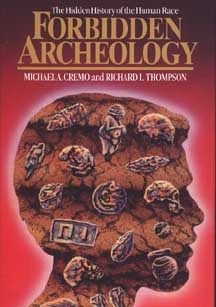 ...
...
Click on any of these books to read more about them and where to get
a copy
or contact your local temple for purchases
sample of Life
comes from Life HERE.pdf

Lotus Imprints - Preserving Prabhupada's Legacy - The
Publishing House of Hari Sauri dasa
http://www.lotusimprints.com/

Quotes from Shastra - scriptures
View using Balaram font
Chandana Yatra
Candana yatra starts on the third lunar day of the waxing
moon of Vaisakha month, and continues for twenty days. Lord Jagannatha
gave direct instructions to King Indradyumna to perform this festival at
this time. Smearing the body of the Lord with ointments is an act of devotion,
and the best of ointments is sandalwood paste. Since the month of Vaisakha
is very hot in India, the cooling effect of the sandalwood is very pleasing
to the body of the Lord.
Sandalwood paste is applied all over the body of Jagannatha
leaving only his two eyes visible. The utsava murtis (functional Deities
- Vijay utsav) are taken on procession and are placed in a boat in the
temple pond. To commemorate this festival, Lord Caitanya also carried out
water sports with his devotees.
One can apply the candana saying:
Om gandhadvaram duradarsan
nitya pustam karisinim
isvari'gum sarvabhutanam
tvam ihopa hvaye sriyam
In Vrindavan and Mayapur other Deities are also anointed,
such as Lord Nrsimha deva below:.
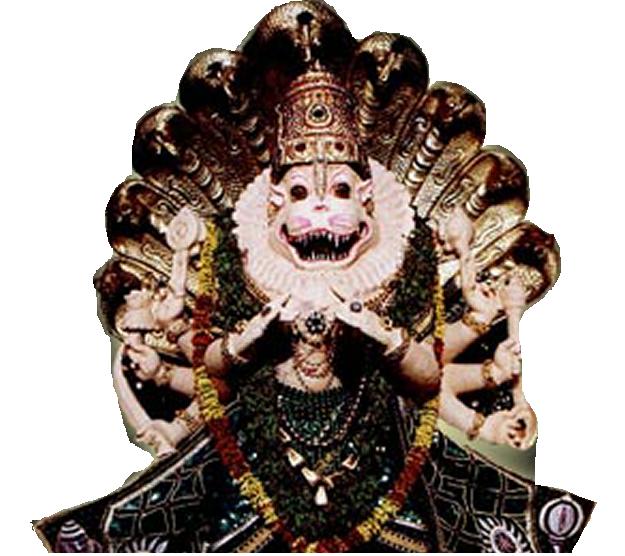
Lord Nrsimhadev in Mayapur
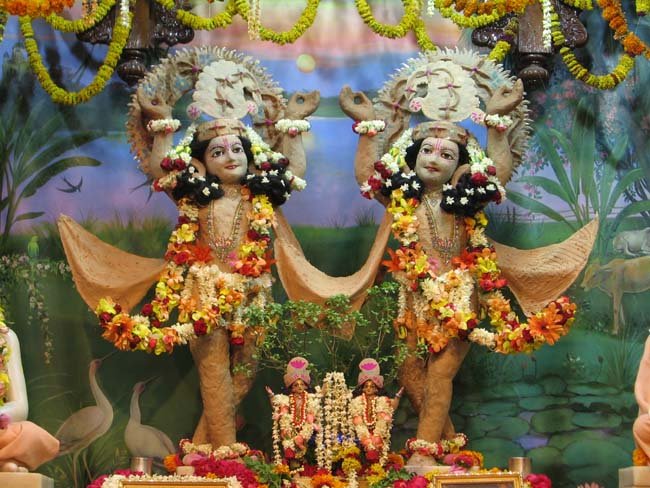
Sri Sri Gaura Nitai in Vrindavan 2004
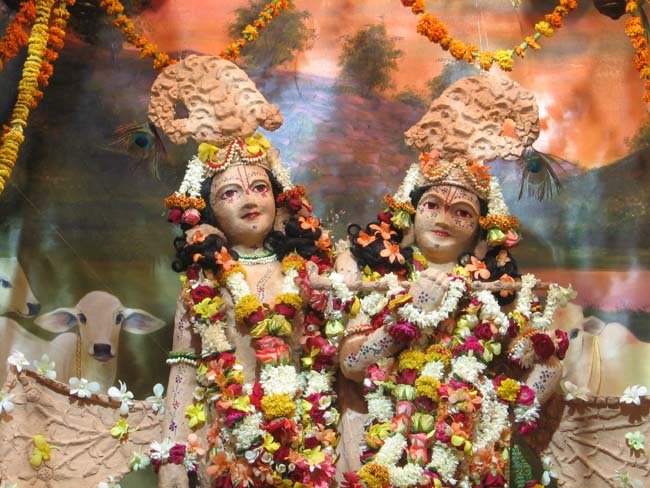
Sri Sri Krishna Balaram during Chandan yatra Vrindavan 2004
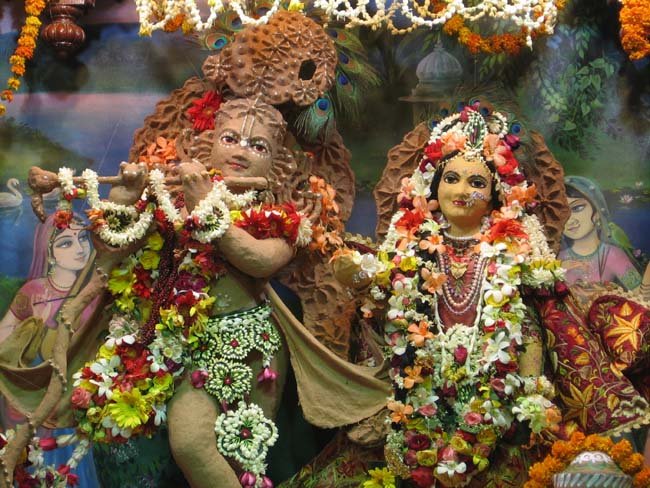
Sri Sri Radhe Shyamasundar during Chandan yatra 2004
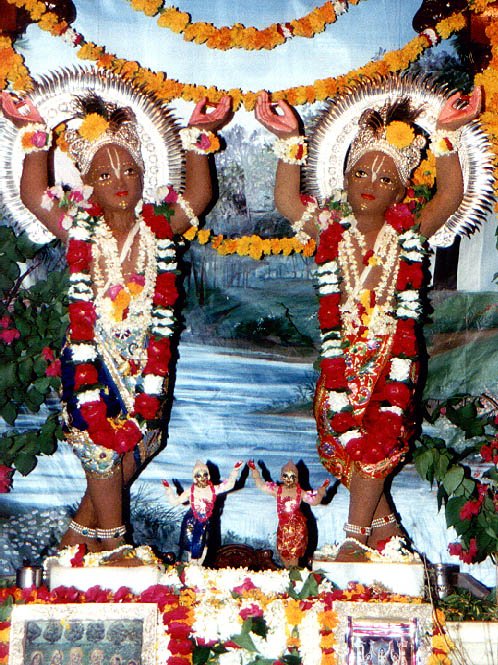
Sri Sri Gaura Nitai in Vrindavan during Chandan yatra 2002
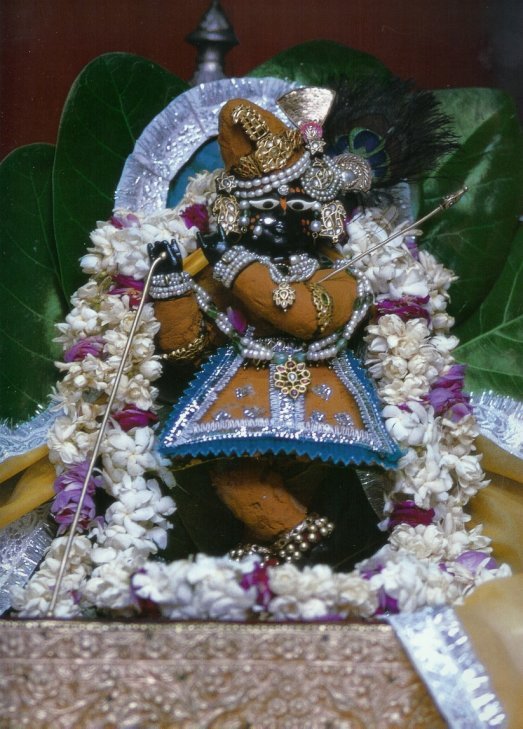
Sri Sri Radha Raman Ji in Vrindavan during Chandan yatra
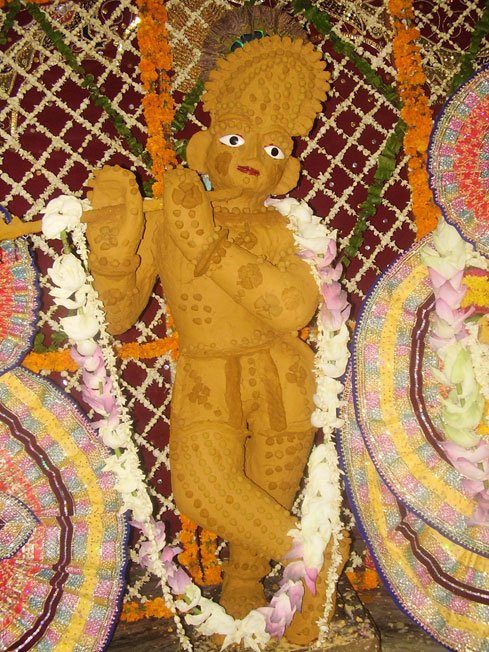
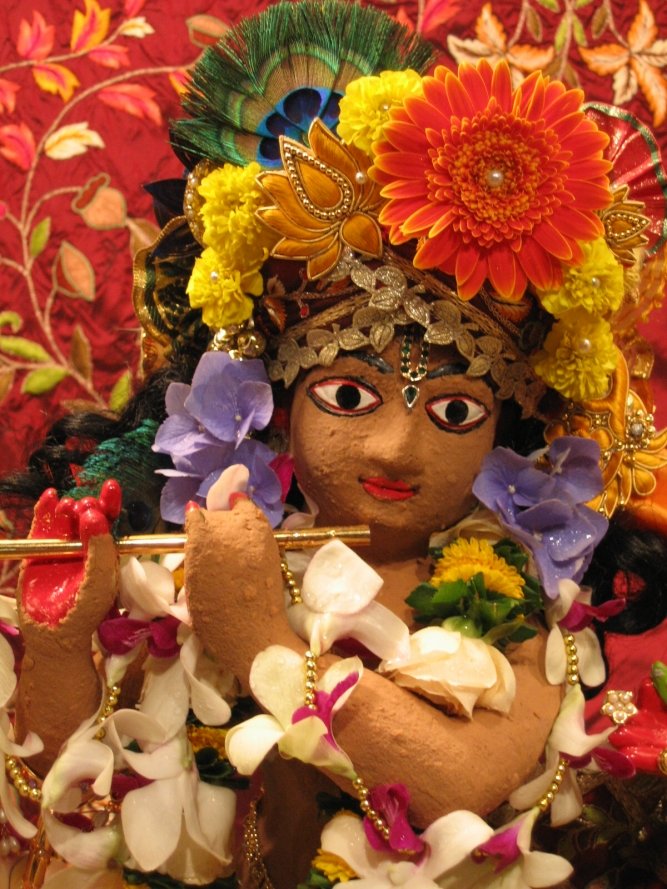
Gopivallabha in Boston USA during Chandan yatra

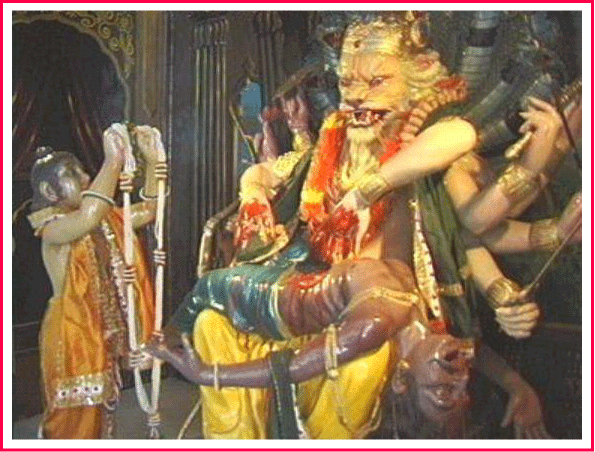
For more information on the Narasimha Avatara of Vishnu:
http://narasimha.avatara.org/
Pictures of the Narasimha
and other avataras:
Mantras to Lord Narasimha
Nrisimha Kavacha - shield:
of both Brahma and Prahlad maharaj:
108 Names of Narasimha
for yajas - homa - havan
Sri Narasimha
Nakha Stuti:
The Nrisimha story
Prayer to Lord Nrsimha
 (from
Sri
Dasavatara-stotra, p. 97)
(from
Sri
Dasavatara-stotra, p. 97)
tava kara-kamala-vare
nakham adbhuta-srngam
dalita-hiranyakasipu-tanu-bhrngam
keshava dhrta-narahari-rupa
jaya jagadisa hare
"O Keshava! O Lord of the
universe! O Lord Hari, who have assumed the form of half-man, half-lion!
All glories to You! Just as one can easily crush a wasp between one's fingernails,
so in the same way the body of the wasp like demon Hiranyakashipu has been
ripped apart by the wonderful pointed nails on Your beautiful lotus hands."
"The fourth incarnation is Nåsiàhadeva.
Nåsiàhadeva appeared to save Prahläda Mahäräja,
who was five-years-old boy and he was being tortured by his atheistic father.
So He appeared from the pillar of the palace as a half-man, half-lion.
Because this Hiraëyakaçipu took benediction from Brahmä
that he’ll not be killed by any man or any animal. So the Lord appeared
neither man nor animal. This is the difference between the Lord’s intelligence
and our intelligence. We are thinking that we can cheat the Lord by our
intelligence, but the Lord is more intelligent than us. This Hiraëyakaçipu
wanted to cheat Brahmä by indirect definition. First of all he wanted
to become immortal. Brahmä said, “That is not possible because even
I am not immortal. Nobody in this material world is immortal. That is not
possible.” So Hiraëyakaçipu, the demon... The demons are very
intelligent. He thought that “Round about way I shall become immortal.”
He prayed to Brahmä that “Please give me the benediction that I shall
not be killed by any man or any animal.” Brahmä said, “Yes, that is
all right.” “I shall not be killed in the sky, on the water or on land.”
Brahmä said, “Oh yes.” “I shall not be killed by any man-made weapons.”
“That’s all right.” In this way he utilized his intelligence in so many
ways just to come to the conclusion of being immortal. But the Lord is
so cunning that He kept intact all the benediction given by Brahmä,
still he was killed. He said that “I’ll not be killed either during daytime
or night.” Brahmä said “Yes.” So he was killed
just in the evening, just in the junction of day and night. You cannot
say it is day or night. He took the benediction that “I shall not be killed
in the sky, on the water, on the land.” So he was killed on His lap. He
took the benediction that “I shall not be killed by any man-made or any
God-made weapons.” That was given, “All right.” So he was killed by the
nails. In this way, all the benedictions were kept intact, still he was
killed. Similarly, we may make plan, we may make very advancement in scientific
knowledge, but the killing process of nature will be there. Nobody can
escape. By our intelligence we cannot escape. The four principles of material
existence means birth, death, old age and disease. We can manufacture many
medicines, many weapons, many means, many methods, but you cannot escape
these four principles of material existence, however great you may be.
That was proved by Hiraëyakaçipu. Hiraëyakaçipu
was one of the stalwart materialistic and he wanted to live forever, enjoy,
but he also could not live. Everything was finished" (A.C. Bhaktivedanta
Swami Prabhupada. 18th February 1970. Class on Sri Varaha-dwadasi purporting
the Dasavatar-stotra - Ten main incarnations of the Lor. Los Angeles.)
Courtesy of http://www.vedabase.com/
used
with permission

Lord Nåsiàhadeva’s Appearance
Day
Srila A.C. Bhaktivedanta Swami Prabhupada. Çrémad-Bhägavatam
7.5.22-34. Los Angeles, May 27, 1972,
720527SB.LA
Prabhupäda: So today, appearance day
of Lord Nåsiàhadeva. Lord Nåsiàhadeva appeared
on this Nåsiàha Cäturdaçé on account of
His devotee, Prahläda. As it is stated in the Bhagavad-gétä,
yadä yadä hi dharmasya glänir bhavati bhärata, abhyutthänam
adharmasya [Bg. 4.7]. Pariträëäya sädhünäà
vinäçäya ca duñkåtäà, sambhavämi
yuge yuge [Bg. 4.8]. The Lord appears with two purposes. Pariträëäya
sädhünäm: just to give protection and rescue the devotees,
and to kill the demons, vinäçäya ca duñkåtäm.
So Prahläda Mahäräja, five-years-old boy, his only fault
was that he was Kåñëa conscious. He was devotee of Kåñëa.
That was his only fault. And the father was so unkind to a child, even
five years old. He could not excuse, “Oh, let this boy do whatever, chanting
Hare Kåñëa.” No. The demons are so much against God consciousness
that even at his home he would not allow his own child to become God conscious.
This is demoniac civili... So you’ll find many critics, many enemies, because
you are making progress in Kåñëa consciousness. So the
demons are always against this Kåñëa consciousness movement.
That is the whole history. Just like Lord Jesus Christ, he was crucified.
What was his fault? He was preaching God consciousness, that’s all. This
society is so cruel. So Prahläda Mahäräja was tortured in
so many ways. The torturing methods, I think you will find as you will
see in today’s picture, how Prahläda Mahäräja was tortured.
So one day, Hiraëyakaçipu... After
all, he was his son. Affection was there. So one day, Hiraëyakaçipu
asked the boy,
prahrädänücyatäà täta
svadhétaà kiïcid uttamaà
kälenaitävatäyuñman
yad açikñäd guror bhavän
[SB 7.5.22]
So he asked his son, “My dear son, what you have
learned? The best thing, what you have learned from your teachers, so you
kindly let me know.” So Prahläda Mahäräja informed that
“I have learned like this.” What is that?
çravaëaà kértanaà
viñëoù
smaraëaà päda-sevanam
arcanaà vandanaà däsyaà
sakhyam ätma-nivedanam
iti puàsärpitä viñëau
bhaktiç cen nava-lakñaëä
kriyeta bhagavaty addhä
tan manye ’dhétam uttamam
[SB 7.5.23-24]
Tan manye ’dhétam uttamam: one who is engaged
in the matter of hearing about Viñëu, çravaëaà
kértanamviñëoù. We are engaged in hearing and
talking and chanting about so many things non-Viñëu. Just like
you’ll find thousands of, millions of different types of magazines sold
in your country, in all countries. Some of the magazines are sex literature,
some cinema literature, some this literature, that... So many different
types. There is one paper I have seen, “Diabetes Literature.” There are
many patients of diabetes, so they have formed a society, “Diabetic Society.”
I have seen it. (laughter) And there are many diabetic patients, they are
being hoaxed, that “You pay two dollars per year, and you get all information
how to protect yourself from diabetes disease.” So in America two dollars
is nothing, but it is collecting millions and millions of dollars, Diabetic
Society. Diabetic magazine. So that sort of hearing and chanting is not
needed. We are not interested in all these magazines, because we are followers
of Prahläda Mahäräja. He’s our äcärya. He’s guru.
Prahläda Mahäräja’s guru is Närada, and Närada
is also our guru. Närada is guru of Vyäsadeva. So we are a branch,
but the original guru is Närada, Brahma-sampradäya. So Prahläda
Mahäräja is also a disciple of Närada Muni.
So he teaches that çravaëaà
kértanaà viñëoù [SB 7.5.23]. We have to
hear and talk and chant about Viñëu. Çravaëaà
kértanaà viñëoù smaraëaà päda-sevanam.
To remember Him always, to worship His lotus feet, päda-sevanam. Arcanam,
temple worship, to keep the Deity nicely worshiped, offer foodstuff, ärati,
this is called arcanaà. Vandanam, offering prayers. Just like we
offer prayer, govindam ädi-puruñaà tam ahaà bhajämi
**. These are prayers. There are so many prayers. Keçava-dhåta
buddha-çaréra, keñava-dhåta narahari-rüpa.
These are all prayers. This is also part of devotional service.
çravaëaà kértanaà
viñëoù
smaraëaà päda-sevanam
arcanaà vandanaà däsyaà
sakhyam...
[SB 7.5.23]
Arcanaà vandanaà däsyam. To
be always in service of the Lord, däsyaà; sakhyam, to make
friendship with Him, to consider Kåñëa as your friend.
He says... Even if I do not say that He’s my friend, He says, “I am friend
of everyone.” Suhådaà sarva-bhütänäm [Bg. 5.29].
He’s friend of everyone. We don’t want His friendship, but He wants our
friendship. He wants us to go back to home, Godhead; we don’t want. So
He is more anxious to take us, exactly like the father is more affectionate
than the son. That’s a fact. So He’s the supreme father. So He wants that
we may be happy, and therefore He comes to show us. He sends His representative,
son. He leaves behind Him books so that we may go back to home, back to
Godhead. So, sakhyam. He’s always sitting with me, within my heart. I am
in the heart, and Paramätmä is also within the heart as friend
to give me advice that “Why you are bothering in this material world? Please
come back to home, back to Me.” This is going on. Sakhyam ätma-nivedanam.
Ätma-nivedanam means fully surrendered. So there are examples of devotees
who, sarvätma-nivedanam. Just like Bali Mahäräja. He gave
everything to Kåñëa, even his body, everything, whatever,
his kingdom, money, everything.
So Prahläda Mahäräja says, iti
puàsärpitä viñëau bhaktiç cen nava-lakñaëä.
All these items means hearing. Hearing about Viñëu, chanting
about Kåñëa, giving everything to Viñëu,
offering prayers to Viñëu, offering arcana, temple worship,
Viñëu. In this way Prahläda Mahäräja summarizes
that “Anyone who is doing like this, everything about Viñëu...”
iti puàsärpitä viñëau bhaktiç cen nava-lakñaëä,
“this nine kinds of different devotional services,” kriyeta bhagavatay
addhä, “directly to the Supreme Personality of Godhead,” tan manye
’dhétam uttamam, “I think he is the best learned man in the world.
He is the most learned.” Tan manye ’dhétam. “He has studied everything
very nicely.” Actually, that is the fact. Jïäna, knowledge Knowledge
means to know Kåñëa, God, and the Vedic injunction is,
yasmin vijïäte sarvam evaà vijïätaà bhavanti.
If you understand the Supreme Lord, then you understand everything. You
haven’t got to study differently different subject matters. Just like we
sometimes talk of science, of astronomy, economics, politics. We talk sometimes.
But we are not going to, or we didn’t study all the subject matter separately.
But in course of our studying Kåñëa consciousness, we
know something of everything. So Prahläda Mahäräja says,
tan manye adhétam uttamam: “One who is engaged in these nine kinds
of devotional services directly...” So Prahläda Mahäräja
recommends, kriyeta bhagavaty addhä tan manye ’dhétam uttamam.
niçamyaitat suta-vaco
hiraëyakaçipus tadä
guru-putraà cedaà ruñä
prasphuritädharaù
As soon as he heard, “Oh, what this nonsense boy
is speaking?” he became so angry that sphuritädharaù. When
one becomes angry, his lips vi..., I mean to say, jumps. What is called?
Quiver, yes. So he became so angry that it is said, sphuritädharaù.
(He) immediately called his teacher. He’s king... Because he thought, “The
rascal teachers, they have taught him like this. I have entrusted the boy
to the teachers, to brähmaëas, and they have taught this Kåñëa
consciousness. So call him. Otherwise, how is that this small boy, five
years old only, he’s talking just like a great saint? So call his teacher!”
brahma-bandho kim etat
te vipakñaà çrayatäsatä
asäraà grähito bälo
mäm anädåtya durmate
Hiraëyakaçipu became bitterest enemy
of Viñëu because his brother Hiranyakña, he was killed
by Viñëu taking the shape of Varäha. You know the story.
Since then, Hiraëyakaçipu was bitterest enemy. “Oh, He has,
Viñëu has killed my brother. So He is my greatest enemy.” So
he won’t hear anything about Viñëu. Any Viñëu devotee,
he will punish him, even his own son. That was his policy. So he immediately
called him, the teachers, and addressed him,
brahma-bandho kim etat te
vipakñam çrayatäsatä
asäraà grähito bälo
mäm anädåtya durmate
So here... Teachers are generally brähmaëas.
Not generally. To become teacher is the business of the brähmaëas.
Brähmaëa means they have got six kinds of... Everyone must have
livelihood. This material world is that you must work; otherwise you cannot
get your livelihood. That is the law, whatever you may be. So the brähmaëas’
means of livelihood, six things: paöhana päöhana yajana
yäjana däna pratigraha. Paöhana means he must be a very
learned scholar, study the Vedic literature, and must teach others also.
That is brähmaëa’s business. And in that way, whatever the disciples
bring, that is his income. No salary, no contract, that “If you pay me
hundred dollars or five hundred dollars weekly, then I can teach you.”
No. There is no such contract. Teaching is free. It is the business of
a brähmaëa to give free education to everyone. Now, it is the...
Just like in our institution, I am your teacher, but there is no such contract
that you have to pay me. But you pay me more than anything. So paöhana
päöhana, that is the means of livelihood of brähmaëa.
And kñatriya, they are kings. They can levy tax of the citizens
because they are giving protection from being hurt by others. Kñatriya
means one who gives protection (to) a man being hurt by others. That is
the real root meaning. Kñatriya. And vaiçya means they should,
kåñi-gorakñya-väëijyam, they should engage
themselves in producing foodstuff, foodgrains, kåñi, protect
cows. Especially gorakñya. As the king is meant for giving protection
to the man, similarly, a vaiçya is supposed to give protection to
the cows, or they keep cows and produce milk products. They are vaiçya.
And çüdra, simply service. So these are the different types
of employment of different kinds of social order. And a king, the king
has to see that everyone is employed. Not that hundreds of people are unemployed,
and government has to give welfare, subsidy. Not like that. The king’s
duty is that everyone is independently earning his livelihood. That is
king’s duty.
So here the teachers are addressed here brahma-bandho.
Brahma-bandho means a person who is born by a brähmaëa father
but is not acting as a brähmaëa. He’s called brahma-bandho, dvéja-bandhu.
Dvéja-bandhu, one who is born of a, actually born of a brähmaëa
father, but he’s not acting as a brähmaëa. So Hiraëyakaçipu
addressed the teachers brahma-bandho, not brähmaëa. “Because
you are untrustworthy. I gave you, I entrusted you with my son to be taught,
and you have taught him this Kåñëa consciousness. So
against my will...” He says practically, brahma-bandho kim etat te vipakñaà
çrayatäsatä: “I entrusted my child for being educated
by you, and you have instigated him to speak in favor of my enemy, Viñëu?
Viñëu is my enemy. How is that?” Asäraà grähito
bälo mäm anädåtya durmate. “This rascal boy, he does
not care for me, and he has learned this Kåñëa consciousness,
and you have taught him. How is that?”
santi hy asädhavo loke
durmaiträç chadma-veçiëaù
teñäà udety aghaà käle
rogaù pätakinäm iva
“So I think these demigods who are followers of
Viñëu, they are coming in disguise and poisoning my son by
teaching Kåñëa consciousness, and you did not take care
of him. So what is this?”
Then the teachers replied,
na mat-praëétaà na para-praëétaà
suto vadaty eña tavendra-çatro
naisargikéyaà matir asya räjan
niyaccha manyuà kad adäù sma
mä naù
They said, “My dear King, don’t think we have taught
him like this. It is not... I know, it is not our duty to teach him against
your will. But his Kåñëa consciousness is not due to
our teaching; neither somebody is coming in disguise and teaching him.”
Na mat-praëétaà na para-praëétam. “He is
neither taught by us, nor by anyone else.” Suto vadaty eña tavendra-çatro.
Indra-çatro. The enemy... The Hiraëyakaçipu is the enemy
of the demigods; therefore he is addressed as Indra-çatro. As he
addressed the brähmaëa, brahma-bandho, so they retaliated also,
that “You are enemy of the demigods.” Naisargikéyam, “By nature
he is doing that. We try to forbid him. We try to stop him chanting Hare
Kåñëa, but still he’s doing.” Matir asya räjan niyaccha
manyuà kad adäù sma mä. “You don’t be angry upon
us. We never did it.” So... “He is, by his own nature he chants, he preaches,
he’s doing all this.”
guruëaivaà pratiprokto
bhüya ähäsuraù sutaà
na ced guru-mukhéyaà te
kuto ’bhadräsaté matiù
Then he again asked his son, “Now I understand
that your teacher has not taught you all these things. You rascal, where
you have learned all this Kåñëa consciousness?” (laughter)
Abhadra. Kuto abhadräsaté matiù: “Wherefrom you got
this rascal wisdom? Tell me.” So this is the position, you see. Even father
becomes enemy.
Now, Prahläda Mahäräja is replying.
Prahläda Mahäräja is replying,
matir na kåñëe parataù
svato vä
mitho ’bhipadyeta gåha-vratänäm
adänta-gobhir viçatäà
tamisraà
punaù punaç carvita-carvaëänäm
[SB 7.5.30]
“My dear father, don’t be afraid. It is not a thing
to be taught.” Matir na kåñëe. “Nobody can become Kåñëa
conscious,” matir na kåñëe parato, “being taught by others,”
matir na kåñëe parataù svato vä, “or by mental
speculation or thinking oneself,” mitho ’bhipadyeta, “or by making conference
meeting, religious meeting, conference.” No. Three things. One thing is
to learn Kåñëa consciousness by speculative method, self-realization.
Just like so many people are very much interested that “Why shall I go
to a guru? I can realize myself. I shall meditate.” So that is called svataù.
And parataù means by others’ instruction. And mitho, mitho means
by assembly. So who? Now, gåha-vratänäm. If one is gåha-vratä...
There are two things: gåhastha and gåha-vratä, or gåhamedhi.
“So those who are gåha-vratä...” because he is pointing out
his father’s position, that he’s gåha-vratä. He has no other
business. He simply wants to get money, hiraëya. Hiraëya means
gold, and kaçipu, a nice apartment. That’s all. So he says that
gåha-vratänäm, “If one makes it his point to remain in
a comfortable home life, for him, either by speculation or by teaching
or by meeting, he’ll never develop Kåñëa consciousness.”
Gåha-vratänäm. Then what is their position? Now, adänta-gobhir
viçatäà tamiñram: “They are unable to control
their senses, and as such, they are entering into the darkest region of
material existence.” Punaù punaç carvita-carvaëänäm:
[SB 7.5.30] “Their only business is chewing the chewed.” They have no other
ways. Gåha-vratänäm, those who want to be happy materially,
actually they are chewing the chewed. Material happiness means sex life,
ultimate, utmost, topmost happiness. So people are simply trying to, how
to utilize this sex life in so many ways, in pictures and in... I do not
wish to discuss. In dancing, in club, in so many ways. Because they cannot
control the senses. The same thing, same thing, the same sex life in different
way. Sometimes a naked dance, sometimes in this way, sometimes in that
way. Therefore it is called punaù punaç carvita-carvaëänäm
[SB 7.5.30]. I have heard that some people go to Florida and they spend
fifty thousand dollars per week for organizing naked dance. So naked woman
he has seen so many times, but still he spends more money to see it in
a different way. That is called punaù punaç carvita-carvaëänäm
[SB 7.5.30], “chewing the chewed.”
So persons who are too much attached to sense
gratification, and they have made it their conclusion that “We shall be
happy within our family life or this social life...” Vidyäpati sings,
tätala saikate väri-bindu sama suto-mita-ramané-samäj(?).
Our society means... Society, friendship, and love. There must be woman,
must be children, suto-mita-ramané-samäje. So there is some
pleasure, undoubtedly. Otherwise, why people are working so hard to stick
to this position? Vidyäpati sings that tätala saikate väri-bindu
sama suto-mita-ramané-samäj(?). There is undoubtedly some pleasure,
but that pleasure is so insignificant that it can be compared: a drop of
water on the desert. Desert, if you want to utilize desert to make it a
garden or productive field, you have to pour water. The whole ocean water
you have to pour there. Now, if somebody says, “All right, you want water.
Now take this one drop water,” then what it will do? Similarly, our heart
is hankering after so many things. We are hankering... Actually we are
hankering after Kåñëa, but we do not know. We are trying
to satisfy our hankering in so many ways in material life. Actually we
are hankering after Kåñëa. Just like a small child, it
is crying. It cannot express, but it is wanting the mother’s breast feeding.
So you cannot stop him crying unless it is transferred to the mother. Similarly,
actually we love Kåñëa. That is a fact. Because we love
Kåñëa... Therefore you, who did not hear even the name
of Kåñëa, say, four or five years ago, why you after
so much Kåñëa? This is the proof, that actually we are
after Kåñëa. This Kåñëa consciousness
movement is being accepted in Western countries by the younger generation.
Why? Because every one of us, we love Kåñëa. But it is
now covered by mäyä. We have to simply take out the covering,
mäyä; then we are Kåñëa conscious.
That is explained in the Caitanya-caritämåta,
nitya-siddha kåñëa-bhakti ‘sädhya’
kabhu naya
çravaëädi-çuddha-citte
karaye udaya
That Kåñëa consciousness is not
an artificial thing, that we are making some propaganda on Kåñëa
consciousness, publishing some books, magazines, and our preachers are
going place to place. No, there are so many propaganda is going on. But
they are not so effective. And our, what means we have got to make propaganda?
We simply make this propaganda, “Please chant Hare Kåñëa.”
That’s all. Of course, we do sincerely. So if we propagate sincerely and
seriously, as Caitanya Mahäprabhu has ordered, yäre dekha, täre
kaha ‘kåñëa’ upadeça... [Cc. Madhya 7.128]. We
must be sincere. Then, if we canvass, “Please chant Hare Kåñëa,”
it will be effective. It will be effective. The business is not very serious
or very difficult. Caitanya Mahäprabhu says, yäre dekha, täre
kaha ‘kåñëa’... “Anyone you meet, you simply request
him about hearing about Kåñëa.” So... But if one is so
much covered by materialistic enjoyment, it takes little time. It takes
little time. Otherwise, automatically there is love for Kåñëa,
and çravaëädi-çuddha-citte...
Therefore Prahläda Mahäräja says,
çravaëam. If we hear about Kåñëa constantly,
through realized souls, not professional—if we hear, satäà
prasaìgän mama vérya-saàvido [SB 3.25.25]—then
automatically, our dormant Kåñëa consciousness come out.
So Prahläda Mahäräja says, therefore, that “Those who are
determined to become happy within this material world, they cannot be raised
to Kåñëa consciousness either by personal teaching or
by making conference or by mental speculation.” That is not possible, because
he is determined. So our duty is that we should know that in the materialistic
way of life we shall never be happy. This is called knowledge. And vairägya.
So this vairägya and knowledge is not so easy. Prahläda Mahäräja
says, adänta-gobhir viçatäà tamisram: it is not
possible. That means he assures his father, “Don’t be worried. You will
never be Kåñëa conscious. (laughter) Because your only
aim is to stick to home and money and women. Therefore rest assured, you’ll
not be ... It is not that a person like you will be raised to Kåñëa
consciousness.” Then? How you have done? The next question should be: Why
they are sticking to this materialistic way of life?
That is answered by Prahläda, na te viduù
svärtha-gatià hi viñëum [SB 7.5.31]. “These persons,
those who are so much materially attached, they do not know the ultimate
goal of life is Viñëu, the Supreme Personality of Godhead,
Viñëu.” That is actually the ultimate goal of life. We are
here in this material world, forgetting Kåñëa, to enjoy,
to lord it over the material nature. Everyone is trying to become the lord,
master of material... That is struggle. Nobody can become lord or master
of this material world. But that struggle to become master, they are taking
it happiness. They are taking it happiness. That is the nature of persons
who are influenced by the modes of passion. They’ll work hard, and that
will, they will take it is very good, pleasing. Because they do not know
that the... Na te viduù svärtha-gatià hi viñëuà
duräçayä ye bahir-artha-mäninaù [SB 7.5.31].
They are hoping against hope to become happy within this material world.
That is the whole history. Take the history, any history, modern history.
There are so many empires: the Roman Empire, the Carthaginian Empire, the
Greek Empire, the British Empire recently, Hitler’s Nazism, and so many.
For some time they become very powerful. Just like Hiraëyakaçipu,
he’s now very powerful. He’s thinking, “Nobody can...” Now today he’ll
be killed. Keçava-dhåta narahari rüpa is coming. So this
demonic civilization will never be successful. That’s a fact. But they
are so fool, they do not see even historical evidences. So many empires
failed. The Roman Empire failed, the British Empire failed. Still, somebody
is trying to create another empire, another, different empire. Just like
your President Nixon, he’s trying to influence all other nations under
his control. Why? Of course, I should not speak all these things. There
may be criticism. But that is the way, going on. That is the way. We can
understand. We can understand politics, economics, everything, but we do
not bother about. But our aim is that this way of life, to increase materially
happiness, it will never be successful. That is our conclusion. We are
not fools that we have given up everything for advance in Kåñëa
consciousness. Because we know that this, this way we shall never be happy.
It is not possible.
That is explained by Prahläda Mahäräja.
These rascal people who are so much materially attached... Kåñëa
also says in the Bhagavad-gétä,
bhogaiçvarya-prasaktänäà
tayäpahåta-cetasäà
vyavasäyätmikä buddhiù
samädhau na nigacchati
[Bg. 2.44]
Those who are too much attached, bhoga, material
enjoyment, aiçvarya, material opulence ... Bhogaiçvarya-prasaktänäà
tayäpahåta-cetasäm. Persons whose heart has been misled
by this kind of civilization, they cannot take to Kåñëa
consciousness. Therefore to become too much materially opulent is a disqualification
for attaining Kåñëa consciousness. It is a disqualification.
Because they don’t care. Just like in our temple, not very rich men, they
are coming, because they (say,) “What is this nonsense, Kåñëa
consciousness? We have got everything. These boys, they haven’t got to
eat anything; therefore they are chanting Hare Kåñëa
on the street. That’s all.” They think like that. “They’re needy. All right,
they are needy. Give them some money.” That’s all. They don’t like to take
anything from us because the same business, matir na kåñëe
parataù svato vä. They’ll never understand, because their aim
is grha-vratanam. They want to be happy... Although they are seeing there
is no happiness, they never can be happy, still... This is called punaù
punaç carvita-carvanänäm [SB 7.5.30], chewing the chewed.
One, the sugarcane, is chewed by somebody. It is thrown away. And if somebody
else comes and chew it again, what juice he will have it? So punaù
punaç carvita... Na te viduù svärtha-gatià hi
viñëuà [SB 7.5.31]. Duräçayä ye duräçayä
viñaya väsé (reads Sanskrit commentary) tantraya käraëaà
te hi viñëuà na viduù. Tatra hetu svasminn eva
arthe puruñartha yeñäà teñäà
gatià grämyaà. Na tu te ’pi guru pati syät viñëu
jïäsyasi tatra bhak bahir viñaye bahavo yeñäà
te bahir arthas tann eva guru tena mantra çélaà yeñäà
te.
So one who is fixed up in this conclusion, that
“We shall become happy with this materialistic way of life,” they cannot
take to Kåñëa consciousness. And they do not know also
that our ultimate goal of life is Kåñëa, Viñëu.
Then why it is so? Now, andhä yathändhair upanéyamänäs
te ’péça-tantryäm uru-dämni baddhäù.
They have become blind. They are blind themselves, and they are also led
by blind leaders. The leaders, at the present moment, leaders, they say
that “Why you are going to church? Why you are going to temple? If you
want your bread...” Just like in Christian religion you go to church, “O
God, give us our daily bread.” But the atheist class, they are propagating,
“For bread, why you are going to church? You make industry, you make business,
and you get bread.” But actually... We were just talking that there are
so many unemployment. Our Karandhara prabhu was... No. Who was talking?
Çyämasundara. Çyämasundara said that the computer...
What is called, computer? It can do thousands of men’s business. So they
have discovered this machine. That means thousands of men will be unemployed.
That is actually happening in your country due to so many machines. Now,
take for example, formerly... You have seen the picture, Kåñëa,
Våndävana picture, Kåñëa’s father transferring
Kåñëa. They were going on bullock carts, no motorcar.
You have seen the picture. So formerly, transport was bullock carts. The
cows and the bulls, the bulls were employed for agricultural purpose, for
drawing the carts. So there was no necessity of motorcar. Now you have
got motor, motor-tractor. You don’t want the bullocks. Therefore kill them.
How you can utilize them? Therefore you must have slaughterhouse to kill
them. And as soon as you kill them, then you have to eat them. So this
is the, I mean to say, entanglement. If you kill, then you become responsible
for being killed. The subtle laws...
Therefore, without knowing our ultimate goal of
life is Viñëu, na te viduù svärtha-gatià
hi viñëum... [SB 7.5.31]. That is our interest. The human form
of life is offered by nature after so much evolutionary process. Just to
understand Viñëu, God, this is the only business. But instead
of attending our real business, we are trying to be happy in other ways.
Then you can say that “If we are engaged in real business, then how the
economic question will be solved? We have to work.” That’s all right, you
work. But work simple. Why you have invented so much botheration? Work
is there. If you have cows and if you have got land, then you till the
land, get grains, and there is milk, there is fruit, there is flower. Anywhere,
you can live peacefully. Whole economic question is solved. And because
we have forgotten, we have missed the real point, that our life is meant
for God-realization. We are simply increasing botheration. Punaù
punaç carvita. Adänta-gobhir viñatäà tamisram.
Andhä yathändhair upanéyamänäù. The leaders
are blind; we are also blind. So they are advising that “If you want to
solve your economic problem, why you are going to church? Why you are going
to temple? Come here, increase business, industry. Take loan and start
business.” That’s all. This is going on. But actually, the more we are
trying to mislead this people... Because they are thinking it is all right.
They are... That the social condition is becoming more and more grave.
That’s a fact. We are trying to solve one problem, but many other problems
are coming because we do not know what is the ultimate goal of life. Because
we are missing the real point.
Therefore Prahläda Mahäräja said,
na te viduù svärtha-gatià hi viñëuà
duräçayä ye bahir-artha-mäninaù [SB 7.5.31].
These rascals, they are thinking that by so-called economic development,
by exploiting material resources, we shall be happy. That is not possible.
The best example your country has given. You have exploited the material
resources, and other countries are also following, but where is the happiness?
Instead of happiness, there is “hippyness.” (laughter) So still, they have
no eyes to see that “Where we are going?” Adänta-gobhir viçatäà
tamisram punaù punaç carvita-carvanänäm [SB 7.5.30].
Because we cannot control our senses, we are driving, we are being pushed
towards the darkest region of material existence, very hard to leave. Darkest
region means that we are going to become animals next life. Because this
is animalistic civilization. Nature gave us the opportunity to realize
God, but God-realization is meant for human being. The human being, if
he does not realize God, he’s simply engaged in animalistic way of life—eating,
sleeping, mating—then nature will call, “All right, sir, again become animal.”
Punar müñiko bhava: “Again become a mouse.” You know this story?
Punar müñiko bhava. There is a story. There is a very nice
story. One rat, mouse, he came to a saintly person. Everyone comes to saintly
person for some blessing, you see. Real blessing they don’t want. Some
material blessing. Real blessing, Kåñëa, they don’t want.
If you give him some blessing that “You become very rich man and...” These
are all very well, this. So this mouse also came and begged the saintly
person, “Sir, I am in difficulty. If you give me some blessing?”
“What is that?”
“The cat chases after me always. I’m very unhappy.”
“So what do you want?”
“Now, if you make me a cat, then I can get relief
from this thing.”
“All right, you become cat.” So he became cat.
So after few days, again he comes. “Sir, again
I am in trouble.”
“What is that?”
“The dog is chasing me.” (laughter) Don’t laugh,
hear seriously. “Dog is chasing me.”
“All right, then, what do you want?”
“Now, make me a tiger.”
“All right, you become a tiger.”
So when he became a tiger he was staring on the
saintly person like this.
So he asked, “Why you are staring upon me? You
want to eat me?”
“Yes.”
So he again curses, punar müñiko bhava:
“Again you become mouse. Again you become mouse.”
So that is our position. We are advanced in civilization.
Now we want to kill God. So we are again going to be uncivilized, to remain
in the forest and to remain naked. Actually, they are practicing that:
nature’s way. So again they are going to be aborigines. And that is being
practiced. They are going to the forest, they remain naked. So actually,
punar müñiko bhava: “Again become mouse.” Civilized human being
means God conscious, happy life, no trouble, no enviousness, everything
happy, no hard labor. Why hard labor? Everything is there. You just employ
your little intelligence, you get sufficient food by grains, by fruits,
by flowers, milk. There is no difficulty if we remain in our own way. So
that is the difficulty, that we do not know that our ultimate goal of life
is God-realization. Then God has got all arrangement. You cannot produce
fruits and grains in factory. They are given by God. Why? That “You eat
them and be Kåñëa conscious, chant Hare Kåñëa.”
But we don’t want that. We want slaughterhouse, unnecessarily. Actually,
if you go to the store... There are so many stores. How many stores are
selling only meat? It is not possible. Ninety-nine percent fruits, vegetables,
grains you are taking, and maybe a little percentage of meat. So why you
cannot give up this little percentage? If you think that meat is very palatable,
why don’t you live on meat? Russia is also trying like that. That has become
the fashion. In Moscow, it was very difficult to find out nice grains.
With great difficulty Çyämasundara used to spend two hours
daily to secure these things.
So this is the problem. Na te viduù svärtha-gatià
hi viñëuà durañçayä ye bahir-artha
mäninaù [SB 7.5.31]. They are trying to be happy by the arrangement
of these material activities. Andhä yathändhair upanéyamänäs
te ’péça-tantryäm. They do not know that the material
nature is so strong that you cannot get out of it unless you are prepared
to suffer more and more. If you take to natural life and live peacefully
and take to Kåñëa consciousness, that is your real life.
And if you simply increase botheration and problems, then you’ll have to
suffer. That is the position of modern civilization. Actually, superficially
we see that material advancement of material science, people have got so
many machines, so many facilities. But actually, they are in trouble. Just
like I gave you one example: the computer machine. It can work for thousands
of men. So thousands of men means the thousands of men must be unemployed.
And especially in your country, they are taking advantage of this machine
because the salary is If you want to pay to the worker, a big, big salary.
So they want to save. They are taking machine, and they think they will
save money, so many workers. But the workers are becoming unemployed. The
government has to give them welfare. The government will tax. That’s all.
(laughter.) Government will not give money, welfare, from government’s
pocket. The government will increase your taxation. So you are..., you
stop payment by importing some machine, now you have to pay that money
to the government. This is called entanglement. This is a crude example.
I don’t say that you stop all this business, but the material world is
like that. You want to solve something; instead of solving, you’ll create
so many problems. This is material life. Because our life is not meant
for solving problems and creating problems. Our life is meant for understanding
God. Then everything is all right. But that you have given up.
na te viduù svärtha-gatià hi
viñëuà
duräçayä ye bahir-artha-mäninaù
andhä yathändhair upanéyamänäs
te ’péça-tantryäm uru-dämni
baddhäù
[SB 7.5.31]
They do not know that you cannot go an inch beyond
the stringent laws of material nature. That is not possible.
Then the next question is that how... People are
not interested in Kåñëa consciousness, and then, they
are misled by blind leaders. So how, what is the solution? That is Prahläda
Mahäräja saying,
naiñäà matis tävad urukramäìghrià
spåçaty anarthäpagamo yad-arthaù
mahéyasäà päda-rajo-’bhiñekaà
niñkiïcanänäà na
våëéta yävat
Therefore one has to take shelter of a pure devotee.
That is the only solution. He says, naiñäà matis tävad
urukramäìgrhim. The beginning was that “They are not interested
in Kåñëa consciousness.” Then how to become Kåñëa
conscious if that is the solution? Then Prahläda Mahäräja
says, naiñäà matis tävad: “So long one does not
approach a pure devotee,” mahéyasäà niñkiïcanänäm,
“great personalities, who has no more any material interest,” niñkiïcana,
“and takes the dust of his lotus feet on the head...” Naiñäà
matis tävad urukramäìghrim: “So long one does not approach
such personality, there is no possibility of becoming Kåñëa
conscious.” Naiñäà matis tävad urukramäìghrim.
As soon as one approaches the pure devotee and takes the dust of his lotus
feet and puts it on his head, immediately, anartha apagamaù, he’ll
be freed from all this nonsense. That means he’ll forget this idea that
“Materially we can advance.” This is the process. So we have to approach
a niñkiïcana, who has nothing to do with this material world.
His only ambition is to serve more Kåñëa. And if somebody
approaches him and takes the dust of his lotus feet, then he can understand.
Mahéyasäà päda-rajo-’bhiñekaà niñkiïcanänäà
na våëéta yävat. (aside:) Our time is over? All
right.
So in this way Prahläda Mahäräja
talked with his father, and the father became more angry. Instead of taking
the lesson ... Mürkhäya upadeça hi prakopäya na çäntaye.
If you teach lesson to a foolish person, he’ll be simply angry. He’ll not
take your lesson. How it is so? Payaù-pänaà bhujaìgänäà
kevalaà viña-vardhanam. If you keep a snake and if you want
to make friendly behavior with him, that, “My dear snake, don’t bite any
more. I’ll give you milk and banana. You eat here and stay here nicely,”
he’ll not... His poison will increase, and one day he will... There is
a story in the Hitopadeça: one day, one... The same thing. So payaù-pänaà
bhujaìgänäà kevalaà viña-vardhanam.
So these are lessons, stories. So his father, Hiranyakasipu, became more
and more angry. So one day... Because after all, son and father... The
son was simple boy. So one day he said, “Prahläda, I shall now kill
you. I shall see how your Kåñëa saves you.” So immediately,
Prahläda was seeing to the pillars of the hall. He was king. So Hiraëyakaçipu
asked him, “Is your God, Kåñëa, in the pillar?” He said,
“Yes, sir. Yes, my father, He is there.” So immediately, with anger he
broke the pillar and Nåsiàhadeva came out.
Now we can honor Him. (end)
(Srila A.C. Bhaktivedanta Swami Prabhupada.
Çrémad-Bhägavatam 7.5.22-34. Los Angeles, May 27, 1972.
)
All pictures from Srimad Bhagavatam and Iskcon works - Copyright ©2005
The Bhaktivedanta Book Trust
International, on the web at .http://www.krishna.com/.
Used with permission.

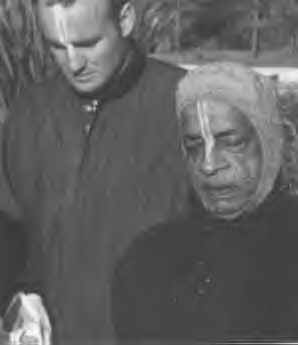
Jayananda dasa Thakur with his Spiritual Master Srila A.C. Bhaktivedanta
Swami Prabhupada.
 The
Jayananda Web-site:
The
Jayananda Web-site:
 Rememberences
of Jayananda:
Rememberences
of Jayananda:
 Memories
of Jayananda Thakur:
Memories
of Jayananda Thakur:
 Sriman
Jayananda Thakur, Bhakti Exemplified:
Sriman
Jayananda Thakur, Bhakti Exemplified:
 The
beautiful life of Jayananda Thakur more excerpts from book being edited:
The
beautiful life of Jayananda Thakur more excerpts from book being edited:
 Quotes
from Srila Prabhupada about Jayananda:
Quotes
from Srila Prabhupada about Jayananda:
 Jayananda
- The First ISKCON Saint:
Jayananda
- The First ISKCON Saint:
 More
Nectar on Jayananda prabhu - see link to his Astrological chart:
More
Nectar on Jayananda prabhu - see link to his Astrological chart:
 Rathyatra
pages:
Rathyatra
pages:
 Srila
A.C. Bhaktivedanta Swami Prabhupada's pages:
Srila
A.C. Bhaktivedanta Swami Prabhupada's pages:
The test of a theory is in its implementation. While one can spend
a lot of time analyzing the process of bhakti, faith readily comes when
one sees the theory in action. Jayananda Prabhu is such a devotee who exemplified
in an almost classical manner the process of bhakti from inception to completion.
When he left his body on May 1, 1977, Srila Prabhupada instructed that
his disappearance day should be celebrated as that of a great Vaisnava.
Observing the pastimes of such devotees greatly reaffirms one's faith in
the process of bhakti.
The background
**************
Jim Kohr was the all-American boy. Handsome, strong, intelligent
born in an upper middle-class family. A good student, he took a degree
in mechanical engineering from Ohio State University. However despite his
outward trappings of success, he was often unhappy, empty and dissatisfied
with the material conception of life. Jim did not fit into the upper class
crowd, so it was not very surprising that he ended up driving cabs in San
Francisco. Though an introspective person, he was not really religious.
His depression was almost suicidal when in 1967 he happened to read a small
article in the San Francisco paper about an Indian Swami who had come to
the Bay area to propagate the chanting of the names of God. For some reason
the article ignited a ray of hope within him. He resolved to attend the
lecture of the Indian Swami.
In the Bhagavad Gita (7.16), Krishna says, 'four kinds of pious
men begin to render devotional service unto Me -- the distressed, the desirer
of wealth, the inquisitive, and he who is searching for knowledge of the
Absolute.' Jim was searching for answers from the material miseries, and
in such a mood took his first step towards his destiny.
The beginnings
**************
Jim was instantly attracted to the Indian Swami, who was none
other than Srila Prabhupada, the founder acarya of ISKCON. He had been
in the U.S.A for only a year and was in the process of establishing his
mission of bringing Krishna consciousness to the Western world. Jim began
to regularly attend the morning Bhagvatam lectures of Srila Prabhupada.
On some occasions Jim would be the only guest listening to the morning
lecture. Soon he became very attached to Srila Prabhupada and his teachings.
Prabhupada lovingly reciprocated and would sometimes personally cook prasadam
for Jim and serve him. Soon thereafter Srila Prabhupada accepted Jim as
his disciple and initiated him with the spiritual name Jayananda.
In Cc Madhya 19.151 Caitnaya Mahaprabhu says that '. out of many
millions of wandering living entities, one who is very fortunate gets an
opportunity to associate with a bona fide spiritual master by the grace
of Krishna. By the mercy of both Krishna and the spiritual master, such
a person receives the seed of the creeper of devotional service.' In this
way Jayananda received the seed of devotion, out of the causeless mercy
of Srila Prabhupada. From the instructions and teaching presented by Srila
Prabhupada, he understood his special relationship with Krishna, with Guru,
and that there is an authorized process to establish this relationship.
Attraction to Krishna consciousness
***********************************
Jayananda was completely enamored by Krishna consciousness. He
would rise every day morning before four, do a little arati, chant his
rounds of japa, read and cook prasad. Then he would go for his 'incense
run' (selling incense sticks). He never deviated from this, he was completely
happy as long as he was practicing Krishna consciousness.
Jayananda worshipped prasadam. When a little prasadam spilled
on the floor he would lick it up. He loved to cook, eat, offer and distribute
prasadam in a big way. He even said 'prasadam' with so much love and devotion
that it made one immediately want to take some.
Another example of his attachment to Krishna consciousness was
his love for the holy name. He was always seen chanting and dancing enthusiastically
during kirtans. One day after working hard for ten hours straight, when
all the other devotees were looking forward to some rest, Jayananda enthusiastically
bounced into the temple room for kirtan. His japa was very intense, very
focussed, as he strove to personally associate with each and every syllable
of the mahamantra.
In Bhakti-rasamrta sindhu, Srila Rupa Goswami mentions that the
process of sadhna bhakti begins with a little faith (sraddha). This faith
then blossoms into a desire for devotee association (sadhu-sanga) and then
into bhajan-kriya (devotional service).
Similarly, Jayananda, after receiving the association of Srila
Prabhupada and other devotees at the temple began to execute devotional
service as per the instructions he received from his spiritual master.
As he executed his sadhna sincerely, he became purified of the material
impediments to devotional service(anartha-nivrttih) and began to manifest
the all-attractive qualities of a pure devotee.
Humility
********
Humility was certainly Jayananda's most prominent quality. He
treated everyone as his superior, even new devotees. Although his service
was glorious, he never wanted any glory. He avoided praise like the plague.
Devotees got to know that if they wanted to keep Jayananda's association
they would better not praise him. His humility was very natural and he
always found something other than himself that was praiseworthy. Even though
he was a senior devotee, older than most of the people around him and eminently
qualified, he was happy to simply serve.
Once a new boy at the temple wanted to do some service and was
asked to help with the trash. The weekly trash run was done by Jayananda,
who cheerfully took the little help the boy gave. Later when the boy became
a devotee, he remembered thinking, 'If the garbage men at this temple can
be so blissful, just imagine what the rest of the devotees are like!'
Caitanya Mahaprabhu, in the third verse of Siksastakam lays down
the qualification for offenseless chanting. 'One can chant the holy name
of the Lord in a humble state of mind, thinking himself lower than the
straw in the street. One should be more tolerant than the tree, devoid
of all sense of false prestige and ready to offer all respects to others.
In such a state of mind one can chant the holy name of the Lord constantly.'
Jayananda exemplified this verse. He was so humble that just being in his
association would make one feel ashamed of one's pride. He was very special,
yet no one paid any special attention to him. That was just the way he
liked things.
Service attitude
****************
Jayananda was an expert at everything: cooking, preaching, Deity
worship, public relations, sankirtan, selling incense, construction, and
anything that it took to spread Krishna consciousness. He was a tireless
worker, first to rise in the morning and last to sleep at night. He was
always running out to get flowers, washing dishes, cleaning the kitchen
or taking out the trash. Whatever service he was given, he would make sure
that it was done, no matter how busy he was or how much personal hardships
he had to endure for it. No matter how hard he was working, he would never
stop for a nap during the day. He seemed inexhaustible.
Many times when Jayananda went to Berkley to distribute leftover
prasadam, he would first organize a crew to clean the kitchen, working
twice as hard as anybody else, then he would transfer the prasadam, load
it into the van, drive it to Berkley, organize the distribution there and
have kirtan while all this was going on. Many years later he readily accepted
the position of the driver for the Radha Damodar travelling sankirtan party,
working side by side with brahmacharis scarcely half his age. In spite
of his advanced position and seniority he never asked for anything special
and readily accepted menial position under new devotees.
In the Vishnu purana, Sri Krishna informs Arjuna that 'one who
claims to be My devotee is actually not My devotee. One who claims to be
the devotee of my devotees is in actuality My devotee'. Jayananda completely
manifested this quality. He was always striving to be the 'dasanudasa',
the servant-of-the-servant. But there was no artificial humility in him.
Material humility is relative, it is predicated on the qualifications of
the recipients. Jayananda had spiritual humility, it was absolute, without
any consideration of the status or qualities of the recipient. He served
every one and expected no one to serve him.
The process of remembering, discussing or enumerating the qualities
and pastimes of the Lord and His devotees is very purifying. This week
we continue the discussion of the qualities of Jayananda Prabhu, who in
the relatively short time he was associated with Krishna consciousness,
perfected his devotional service and left us many instructions by example.
Freedom from fault finding
**************************
Perhaps the most defining characteristic of Jayananda was that
he never criticized anyone. Even if a devotee did something that warranted
criticism, he would usually not say anything, or else make the mistake
appear as something perfectly natural. He never spoke harsh words or chastised
anybody. Sometimes devotees would come to him with expansive ideas of how
to spread Krishna consciousness. Jayananda would encourage these ideas,
however extraordinary. At the same time he was not a fool. He could always
pick up the right man for the job.
In the Nectar of Instruction (Verse 5), Srila Rupa Goswami says,
'one should associate with and faithfully serve that pure devotee who is
advanced in undeviated devotional service and whose heart is completely
devoid of the propensity to criticize others.' Jayananda could not even
bear to hear the criticism of another devotee. If such a thing were happening
he would simply leave the room. These are the characteristics of an uttama-adhikari,
one who has reached the highest level of perfection in his sadhana bhakti.
Dear to everyone
****************
Like the six Goswamis, Jayananda was dear to both the gentle
and the ruffians. He was as much at home with the Italians at the produce
market as he was with the Brahmacharis at the temple. Once a devotee was
approached by a staggering drunk in San Francisco, who looked at his robes
and asked, 'Hey, where is my old friend Jayananda?'
Many devotees who took over Jayananda's old territory would meet
people who would say things like, 'Where is Johnny Ananda?' or 'That man
- he's the nicest and most pure man I've met' or 'I don't know much about
your philosophy, but if Jayananda is into it, it must be all right.'
One woman public official on the San Francisco board was famous
for giving the devotees a hard time during Ratha-yatra. One year when the
devotees approached her, she asked, 'where is Jayananda?' On hearing that
he had passed away she broke down and began to cry. The purity in Jayananda's
heart would touch the even most cynical.
In BG 5.7, Sri Krishna says that 'One who works in devotion, who
is a pure soul, and who controls his mind and senses is dear to everyone,
and everyone is dear to him. Though always working, such a man is never
entangled.' Every one loved Jayananda, since he had completely transcended
the bodily conception. He would approach a drunk, a hippie or a devotee
with the same compassion and enthusiasm. He spoke to the Supersoul in everyone,
and everyone responded accordingly. Like Maharaja Yudhisthira, Jayananda's
enemy was never born.
Expert at engaging everyone
****************************
It is said that though Krishna has nothing to do with non-devotees,
His devotees are even more compassionate than Him and will try and engage
them in the Lord's service. Jayananda was eager to see everyone engaged
in Krishna's service. Whenever a new bhakta would come. Jayananda made
him feel he was engaged in important work. He was older, bigger and stronger
than just about anyone in the temple, and everyone was glad to be working
under him.
His preaching style was very simple and direct. He would speak
from the heart to the heart. Once he was preaching to a couple of hippies,
while crawled under an automobile. All that was visible of him was a pair
of legs, yet the two hippies stood there, transfixed by his message. During
Ratha-yatra time he would organize a crew of cynics, hippies, bloopers,
uncooperative personalities and non-devotees off the street to help build
the carts. He would get them to work for ten to fourteen hours a day, always
glorifying them.
The Cc Antya 7.11 it is stated, 'The fundamental religious system
in the Age of Kali is the chanting of the holy name of Krishna. Unless
empowered by Krishna, one cannot propagate the sankirtana movement.' Because
of the genuine compassion in Jayananda, Krishna gave Him the unique ability
to make people want to render devotional service, directly or indirectly.
Materially renounced
********************
Jayananda had almost no possessions, even during his years as
a householder. What ever he had, he used for the service of the temple
and Srila Prabhupada. When he was gifted five thousand dollars, he promptly
donated that to Srila Prabhupada. In the introduction of the Nectar of
Devotion, Srila Prabhupada acknowledges this contribution. For many years
he was almost single handedly supporting the temple by driving his cab
for 12-14 hours a day. When he was in his last days of his life, he used
the money given to him for his treatment to support the Ratha-yatra in
Los Angeles.
He was extremely careful with what he considered to be Srila Prabhupada's
money. When selling incense, he would sleep on park benches in bitter cold
rather than spend money on a motel. He used his considerable charm to get
people to donate almost every thing that was needed. What he could no get
for free, he made sure that he received a good value for the money spent.
His final lesson in material detachment came when it was discovered
that he was suffering from cancer of the lymph and blood. Jayananda continued
as if nothing had changed. When his body became frail and weak, he continued
preaching, inspiring and organizing from his bed in the hospital. For him
the body was simply a means to render devotional service to the Lord.
In Cc. Madhya 6.254 Caitanya Mahaprabhu summarizes in the phrase
'vairagya-vidya-nija-bhakti-yoga', which means 'renunciation through the
wisdom that comes from practicing devotional service.' Jayananda was a
true sannyasi, as one who did not just renounce material objects but actually
renounced the desire for these material objects. He was always eager to
use everything for the service of Krishna, however he had no personal desire
for anything material.
Jayananda: king of the Ratha-yatra
***********************************
Jayananda was the backbone of the Bay area Ratha-yatra for several
years. Behind the scene he would do everything for the preparation of the
festival. He would beg food, flowers, funds - buy materials and build the
carts. He would arrange for the permits, organize the cooking and serving
of prasad. Although things always went right down the wire, he would consistently
succeed in fulfilling all this plans every year. After the festival he
would cook a cake or a pie for each and every person who had some how helped
in the festival. Because of his efforts the Bay area devotees to this day
enjoy an amazingly harmonious relationship with the city officials.
In his last days Jayananda was busy organizing the Ratha-yatra
from the hospital bed. He would talk to people on the phone, send his associates
to meet various persons and things began to miraculously materialize. Every
moment of his life was preciously used in the service of Krishna.
Mystic opulence
*****************
It is said that pure devotional service brings about much opulence.
Thought the devotees never seek them out, once they are there, they are
used for the service of Krishna.
Jayananda apparently could function with very little or even no
sleep. Towards the last few days of the Ratha-yatra he would sleep less
than three hours a day, yet he was the most energetic and enlivened member
of the crew. His propensity to consume prasad was astounding. He could
consume buckets of halva, plates of samosas and potatoes without any side
effect. When he was in his last days, he was put on an intravenous diet,
yet he would often ask devotees to sneak in huge quantities of samosas
and cheese-potatoes for him, which he would happily consume without any
apparent distress. He would some times sleep in the Bhagavatam classes,
since he was very tired, yet later on he could perfectly quote from the
class or have a deep discussion about its contents.
In BG 4.26, Sri Krishna declares that, 'One who is engaged in
full devotional service, unfailing in all circumstances, at once transcends
the modes of material nature and thus comes to the level of Brahman.' In
the Närada-pancaratra, devotional service to the Lord is likened unto
a queen attended by her maidservants in the form of material opulences,
liberation and mysticism. Jayananda never had any hankering for these,
but when they came, he simply used them in the service of Krishna.
Special relationship with Srila Prabhupada
******************************************
Jayananda has complete faith in Srila Prabhupada. He perfected
his devotion by making the instructions of Srila Prabhupada the very core
of his life. He was advanced enough to realize that real association was
through following the instructions of the spiritual master. Unlike most
of the other devotees, who would go out of their way to get some personal
association of Srila Prabhupada, Jayananda was contend to work in the background,
carrying out his instructions. He exemplified the superiority of association
by vani (instructions) over vapu (personal association). Srila Prabhupada
would invariably call of Jayananda when he was in the temple. Jayananda
would resist saying, 'No, I cannot go. I am too dirty. I am too fallen,'
such were the transcendental exchanges between the spiritual master and
his dear disciple.
In Cc. Madhya 19.151, Caitanya Mahaprabhu says that, 'Among all
the living entities wandering throughout the universe, one who is most
fortunate comes in contact with a representative of the Supreme Personality
of Godhead and thus gets the opportunity to execute devotional service.'
Jayananda was one of these fortunate souls who came in contact with a pure
devotee of the Lord and under his guidance was able to perfect his devotional
life.
Conclusion
**********
Jayananda passed away on May 1, 1977. He joined the Krishna consciousness
movement in 1967, just when it is in its beginning, and left the planet
a few months before Srila Prabhupada. In the scriptures it is said that
when the pure devotees of the Lord appear to execute His will, their associates
invariably accompany them. One cannot help but speculate that Jayananda
had only come to serve his eternal spiritual master. The fact that Srila
Prabhupada was on this planet at the time of his passing away is also significant.
It let Srila Prabhupada affirm that 'every one should follow the example
of Jayananda.'
We offer our most humble obeisances to Sri Srimad Jayananda Prabhu,
the exemplary teacher of devotional service in Krishna consciousness.
Courtesy of http://www.vedabase.com/
used
with permission









![]()
![]()
![]()
![]()
![]()

![]()
![]()
![]()
![]()

![]()
![]()
![]()
![]()























 The
Jayananda Web-site:
The
Jayananda Web-site:
